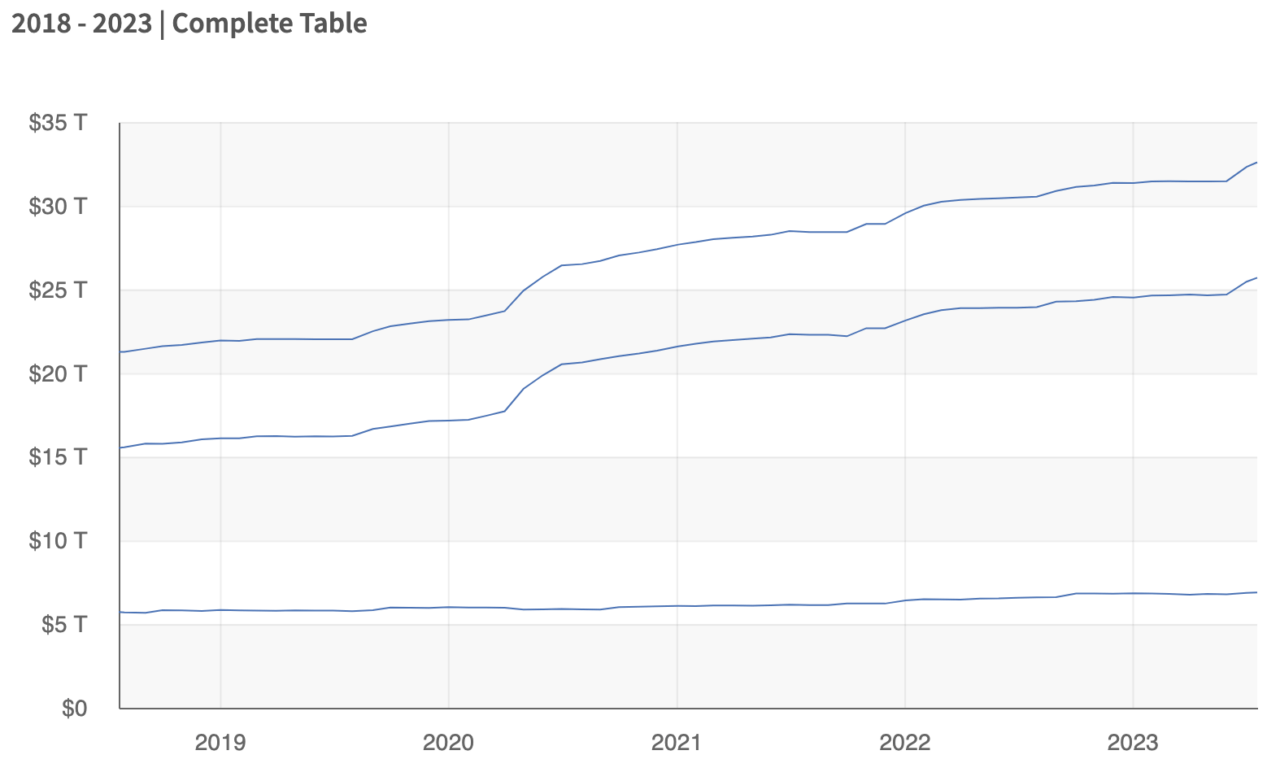The U.S. national debt is skyrocketing, with a staggering $57 billion increase recorded in just four days.
According to data from the U.S. Department of the Treasury’s Bureau of the Fiscal Service, from June 1 to July 6, 2023, the U.S. Total Public Debt Outstanding surged by over $1 trillion and from July 17 to July 20, it went from $32,535,010,186,295.34 to $32,592,226,328,901.30, which is an increase of over $57 billion.
But what exactly is the Total Public Debt Outstanding, and why does it matter? In simple terms, it represents the total amount of debt the U.S. federal government owes to creditors – both external and internal. This includes debt held by the public, such as U.S. Treasury securities held by individuals, corporations, and foreign governments, as well as intragovernmental holdings, which are government account series securities held by federal agencies. The level of public debt is crucial as it can influence interest rates, impact the country’s credit rating, and affect economic growth.
In an interview with Bloomberg TV on 20 July 2023, billionaire investor David Rubenstein shared his concerns about the U.S.’s growing debt pile.
David Rubenstein is a highly successful investor and generous philanthropist, renowned for co-establishing The Carlyle Group, a leading private equity investment firm headquartered in Washington, D.C. He launched the company in 1987 alongside William E. Conway Jr. and Daniel A. D’Aniello.
Born in Baltimore, Maryland in 1949, Rubenstein hails from a Jewish family. He completed his undergraduate studies at Duke University in 1970 and went on to receive his Juris Doctor from the University of Chicago Law School in 1973. Prior to his venture with The Carlyle Group, Rubenstein had a career in law in New York and also served as a domestic policy advisor during President Jimmy Carter’s administration.
According to an article by The Daily Hodl published earlier today, Rubenstein said on Bloomberg TV that the only way for the U.S. to manage this escalating debt is through inflation, a strategy that he believes would exacerbate the country’s income inequality gap. Rubenstein explained that inflating the economy is the only viable option, as the government is unlikely to cut expenses or significantly increase taxes.
Rubenstein also highlighted the potential social implications of this economic strategy. He warned of a looming clash between the haves and the have-nots, particularly between older and younger generations. As older people live longer, their retirement benefits may not keep up with their needs, leading to conflicts with younger generations who may not want to work harder to fund these benefits.
Regarding the increasing income inequality in the U.S., he noted that many people no longer believe in the American dream, particularly those born there who feel that social factors are stacked against them. He argued that this perception contributes to the widening income inequality gap.
Rubenstein also touched on the shifting global economic landscape. He suggested that America’s days of global economic dominance are numbered, with countries like China and India poised to surpass the U.S.. He called for a new generation of leaders in American businesses and Congress to bring fresh ideas to drive the country’s future.
Featured Image by Mackenzie Marco via Unsplash
Source: Read Full Article
-
Philippine SEC warns against unlicensed crypto exchanges amid FTX collapse
-
Bitcoin Bulls, Rejoice! Price Nears $30k as SEC Spot ETF Approval Inches Closer – Coinpedia Fintech News
-
Can Increased Odds of a Recession Cause Crypto to Rise?
-
Swiss court gives green light for FTX to sell its European arm
-
Ripple Secretly Preps for Game-Changing IPO: Key Hints


